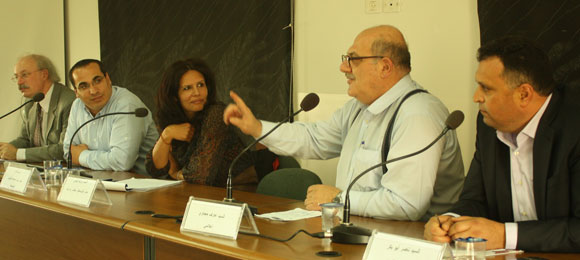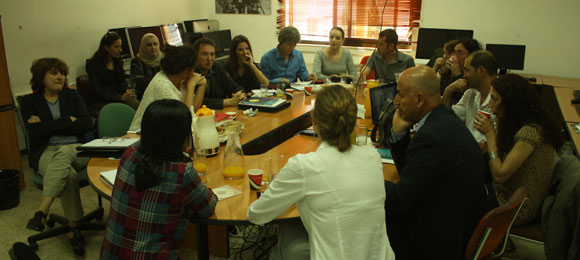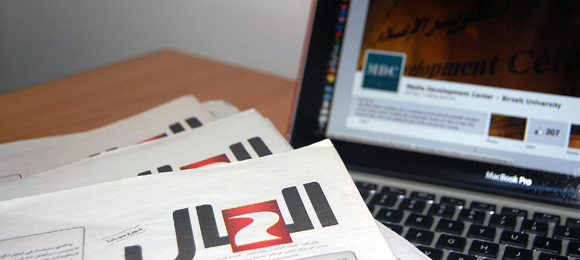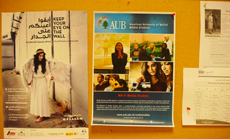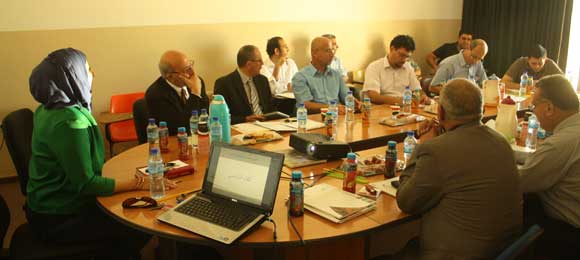
MDC has launched, last Wednesday, the Palestinian Media National Strategy during a ceremony with the participation of partners of the strategy.
In his speech, Dr Khalil Hindi President of BirZeit University welcomed the audience and appreciated the cooperation between the Council of Ministers, the Government Media Center and the Journalists Syndicate as well as the universities and local partner organizations in this national project.
Dr. Hinidi added that what is being sought to invest in this partnership in order to create a framework for all the efforts put forth to advance the Palestinian media. This framework shall diminish waste of money and resources in scattered, contradicting of replicated efforts.
Dr. Hindi pointed out the endeavor to root the ultimate goal; build, maintain and keep sustainability of media capacities, and that will be done through raise journalists' and citizens' awareness of their rights and duties in a society characterized by freedom, equality and networking with local, regional and international partners.
Also, the objective was set to promote Palestinian media level through participation in discussions on media policies and provide advocacy to state bodies and civil society organizations. For her part, Director of BZU Media Development Center Mrs. Nibal Thawabteh welcomed project partners and attendees, adding that inspiration for the national media strategy sprung from the urgent need to organize and manage national media development efforts, set qualifying criteria and frameworks for journalists, as well as agree upon an advocacy plan and normative, moral and legal framework that would contribute to freedom, novelty and professionalism of the national media.
Head of Government Media Center Dr. Ghassan el-Khatib said that project concept meets needs of various parties who have nothing to do with media, whether journalists, the public, NGOs and state bodies. Dr. el-Khatib reiterated that the government will facilitate action of the national workforce on implementation of strategy in order to promote media performance, provided that graduating exceptional journalists would be one of the project outcomes. ''We hope that this workforce would handle 'legislation' issue according to initial draft, as we are desperate to review all legislations pertaining to media. We also need a high council for media, together with continue activation and widening of journalists union, and consider the main gap in the Palestinian media for not being the primary source of information for the Palestinian people, where they mostly rely on foreign media. We must do better to develop an effective public opinion that protects freedom of the press and freedom to express opinion, provide and develop a more tolerant culture that could deal with multitude of opinions and officials' criticism'', Dr. el-Khatib said.
Represented by its head Dr. Abdul Nasser Najjar, journalists syndicate welcomed the strategy, emphasizing that the syndicate will adopt it as it believes it will be the first practical step towards getting out of the media impasse the syndicate witnesses, since the phase we undergo is not clear yet, and whether the Palestinian people will opt for resistance or not, having the Independent State project uncompleted. "The most important step to make this plan happen is drafting this strategy so that it could develop and improve local media and achieve the public media, as the people is main motivation for that", Dr. Najjar added.
Press and media professor at BZU Mr. Abdul Rahim Abdullah stressed in his speech that the strategy will set through discussion and academic/research output a normative framework that would be agreed upon nationwide to come up with the desired Palestinian media, and that it will also set a systematic framework for action to put the normative framework into action, and within a three-year plan that is binding to all parties (the government, local and international stakeholders) in terms of financing, supervision and implementation.
In his interposition, editor-in-chief of Palestine News Agency (WAFA) Mr. Ali Hussein suggested that a specialized media school must be established, adding that we are going through media industry stage; and therefore we need certain criteria to govern this industry, taking into account the academic outputs that are not professionally qualified.
On behalf of Palestine Broadcast Corporation (PBC), head of radio programs department Mr. Emad el-Asfar said that the beneficiary to likely take advantage of this effort the most will necessarily be the radio, as it is Palestine's biggest media branch, showing PBC readiness to cooperate in order to make this strategy succeed. Additionally, the media strategy release event saw many interpositions that asserted the need cooperation of all Palestinian media foundations for the success of the strategy.
